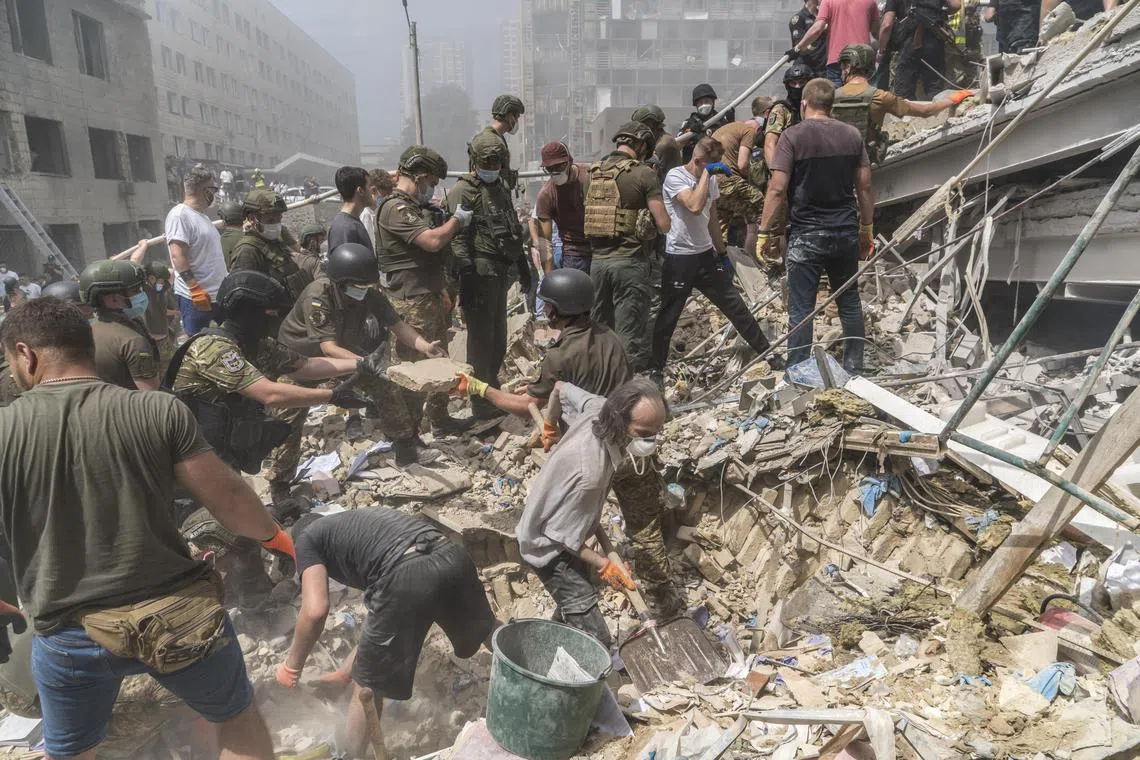Hospital in Ukraine took direct hit from Russian missile, UN analysis suggests
Sign up now: Get ST's newsletters delivered to your inbox

Rescuers and volunteers clearing rubble and searching for survivors after a Russian missile strike on Ohmatdyt Children's Hospital in Kyiv, on July 8.
PHOTO: NYTIMES
Follow topic:
KYIV – A UN rights mission said on May 9 that there was a “high likelihood” Kyiv’s main children’s hospital took a direct hit from a Russian missile during a series of air strikes on Ukrainian cities, as the Kremlin continued to deny involvement.
Ukraine flew its flags at half-mast in a national day of mourning to mark the deaths of 41 people killed across the country in the July 8 air attacks, including four children and two people at Ohmatdyt Children’s Hospital in the capital.
“Analysis of the video footage and an assessment made at the incident site indicates a high likelihood that the children’s hospital suffered a direct hit rather than receiving damage due to an intercepted weapon system,” the head of the UN Human Rights Monitoring Mission in Ukraine said.
Ukraine’s security service said it had unequivocal evidence that the medical facility was hit by a Russian Kh-101 cruise missile during the deadliest series of strikes in months, and published images of what it said were fragments of the weapon’s engine.
The Kremlin said, without providing evidence, that it was Ukrainian anti-missile fire, not Russia, that struck the children’s hospital, which is one of Europe’s largest and treats patients with serious conditions such as cancer and kidney disease.
Damage at the site triggered millions of dollars in donations from inside Ukraine and abroad, more than 28 months since Russia’s full-scale February 2022 invasion.
Nato on July 9 begins a three-day summit of the alliance’s leaders in Washington, with Ukrainian President Volodymyr Zelensky set to attend as he seeks to win commitments from allies to beef up Ukraine’s air defences and boost their military support.
Russian forces are slowly advancing and claimed on July 9 the capture of the village of Yasnobrodivka in the eastern Donetsk region. There was no immediate comment from Ukraine, which has reported heavy fighting in the region for months.
During a visit to Moscow, Indian Prime Minister Narendra Modi told Russian President Vladimir Putin that the “heart bleeds” when children are killed in war, conflict or a terrorist attack.
Mr Modi’s pointed remark was an implicit rebuke to Mr Putin, who moments earlier had welcomed him to the Kremlin with a warm statement on the importance of the strategic ties between the two countries.
Mr Zelensky has blasted Mr Modi’s trip to Russia, calling it “a huge disappointment and a devastating blow to peace efforts”.
The Ukrainian leader vowed retaliation against Russia after the July 8 attacks, and Russia’s Defence Ministry said it had subsequently shot down 38 drones. A Russian regional governor reported fires at an oil depot and an electricity substation.
A security source told Reuters that Ukrainian drones had attacked a Russian oil refinery, a military airfield and an electricity substation in a joint operation.
Rescue operations
Rescuers concluded operations at the children’s hospital earlier on July 9. Elsewhere in the capital, five bodies were recovered from the ruins of a residential building where 12 people were killed, Mayor Vitali Klitschko said.
Mr Zelensky put the death toll from the July 8 assault at 38 with 190 wounded, although tallies of casualties from impact sites in different regions brought the total to at least 41.
Okhmatdyt’s general director Volodymyr Zhovnir told reporters that one of their young doctors had been killed, the building for dialysis had been completely destroyed and that they no longer had electricity supply.
“At least four buildings of the hospital were partially destroyed,” he said.
Ukrainian business leaders rushed to announce donations to rebuild the hospital.
There was no available figure for the total amount of donations, but Reuters calculations based on statements and Ukrainian media reports put the figure from Ukraine’s corporate section at about 300 million hryvnia (S$9.9 million).
In Kyiv, 34-year-old Oleksandr Baraboshko, a strategic communications consultant, said aerial attacks such as those on July 8 served to unite Ukrainians against Russia.
“They’re not scaring us. On the contrary, they’re motivating us to do even more,” said Mr Baraboshko, who helped coordinate an effort with a local shop to distribute gloves and tools to volunteers clearing debris at the hospital.
In Geneva, the World Health Organisation’s (WHO) Mr Tarik Jasarevic said the hospital strike was one of 1,882 attacks on healthcare in Ukraine that have killed a total of 150 people in the more than two-year conflict.
The WHO does not attribute blame for the attacks. REUTERS

